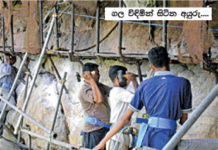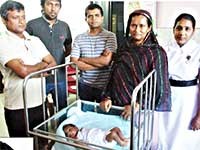Sri Lanka teamed up on Tuesday with Google to bring high-speed Internet access to the island using balloons, aiming to become the first country in the region with complete coverage.
Foreign minister Mangala Samaraweera said officials signed an agreement with Google in the capital Colombo to launch the helium-filled, high-tech balloons above the Indian Ocean island in coming months.
Google announced Project Loon in 2013 aimed at delivering Internet connections to remote or rural areas worldwide using gear floating from thousands of the balloons.
“The entire Sri Lankan island ? every village from (southern) Dondra to (northern) Point Pedro ? will be covered with affordable high speed Internet using Google Loon’s balloon technology,” said Samaraweera, who is also IT minister.
Officials said local Internet service providers will have access to the balloons, reducing their operational costs.
Muhunthan Canagey, head of local authority the Information and Communication Technology Agency, said he expected Google to have finished sending up the balloons by next March.
“Service providers will be able to access higher speeds and improve the quality of their existing service once the balloon project is up and running,” Canagey told AFP.
“We can also expect prices to come down,” he said after he signed the agreement with Michael Cassidy, a Google vice president .
The balloons, once in the stratosphere, will be twice as high as commercial airliners and barely visible to the naked eye, Google has said.
Google plans to keep the balloons aloft in the stratosphere for 100 days, transmitting Internet signals to the ground, and with their movements guided by an algorithmic formula. Tests were carried out in New Zealand in 2013.
Official figures show there are 2.8 million mobile Internet connections and 606,000 fixed line Internet subscribers among Sri Lanka’s more than 20 million population.
Sri Lanka became the first country in South Asia to introduce mobile phones in 1989 and the first to roll out a 3G network in 2004. It was also the first in the region to unveil a 4G network two years ago.
AFP





















